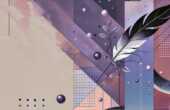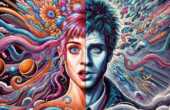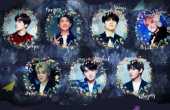Beatrix Kondo
Meet Beatrix Kondo, your friendly neighbourhood storyteller who, much like a Digimon, evolved from a chibi writer into a seasoned wordsmith. Based on POA, RS, Brazil.
Contributor III
- Plebian Penman
- Common Writer
- Aristocratic Author
- Lurker
- Pssst
- Hand Raiser
- Sharp-Eyed Citizen
- Town Watch
- Detective Deskman
- Actor
- Otaku
- ?
- Articles
12 - Featured
10 - Comments
75
- Ext. Comments
33 - Processed
37 - Revisions
29
- Topics
22 - Topics Taken
9 - Notes
22
- Topics Proc.
25 - Topics Rev.
7
- Points
2433 - Rank
52 - Score
1349
Latest Articles
Latest Topics
Bridging Realms: How Arcane Strengthened the Connection Between League of Legends and Its LoreThis article could explore how Arcane expanded the League of Legends universe, focusing on how the series enriches the game’s storytelling. It might analyze how the show balances accessibility for non-gamers with deep nods to League fans, and what this approach means for the evolution of narrative-driven gaming.
|
Revisiting Hogwarts: The Potential and Pitfalls of Reimagining Harry Potter for TelevisionThe writer could explore the challenges and opportunities in adapting Harry Potter into a TV series. How might this format allow for deeper dives into beloved characters and overlooked subplots? What risks come with retelling a story already ingrained in global pop culture? The piece could also examine the impact of fandom expectations and the controversy surrounding J.K. Rowling’s public statements on the reception of this adaptation.
|
Player Agency or Illusion? Examining Moral Dilemmas in Narrative-Driven GamesThe writer could analyze how games like The Last of Us Part II and Disco Elysium tackle moral decision-making. Do these choices genuinely empower players, or are they crafted to create the illusion of control? By exploring the narrative techniques behind these dilemmas, the piece could shed light on how game designers manipulate player emotions to craft deeply impactful experiences.
|
True Crime Overload: How Based on a True Story Satirizes Our Obsession with Real-Life TragedyA critical analysis of Peacock’s Based on a True Story, this piece could delve into how the series critiques our cultural fascination with true crime. It might also compare the show’s satirical approach to the glut of documentary releases, examining why audiences are drawn to these stories and the ethical questions they raise about entertainment based on real-life suffering.
|
The Power of Nostalgia in Modern Streaming: Why 90s and Early 2000s TV Shows Are Thriving in the Digital EraThis article could analyze the recent resurgence of 90s and early 2000s TV shows on streaming platforms, exploring why series like Friends, Sabrina, the Teenage Witch, Buffy the Vampire Slayer, and Gilmore Girls—among others—continue to captivate both nostalgic fans and new viewers alike. It could analyze how the thematic elements of these shows—such as friendship, humor, and a focus on "simpler" times—resonate in today’s fast-paced world.
|
Why Uglies Feels Out of Place in Today’s Dystopian LandscapeUglies on Netflix brings back the dystopian genre, but the trend has been out of the spotlight for a while now. Shows like Snowpiercer and others have thrived by taking advantage of the TV series format, which allows for deeper world-building and character development. In contrast, dystopian films often struggle to fit complex narratives into limited screen time. Could Uglies have benefitted from being a series instead of a standalone movie? Let’s explore how dystopian stories are evolving and why the TV format might be their best future. |
Parallel Worlds and Feminist Dystopias: Rediscovering The Heads of Cerberus in Modern Speculative FictionThe Heads of Cerberus by Francis Stevens is one of those early speculative gems that somehow slipped under the radar, despite its daring blend of dystopia and parallel worlds, predating the genre's mainstream appeal. Written in 1919, Stevens’ work subtly tackles themes of oppression, identity, and resistance—issues that still resonate today. This article could reexamine The Heads of Cerberus through a contemporary feminist lens, making comparisons to modern dystopian and speculative fiction. By doing so, it could highlight how Stevens paved the way for today’s narratives of power and rebellion, and why her work deserves a fresh critical spotlight in our current literary landscape. |
Beauty Standards in Dystopia and Drama: Uglies vs. True BeautyUglies on Netflix explores a dystopian society obsessed with physical perfection, a theme that resonates beyond sci-fi. True Beauty, both as an webtoon, anime, and K-drama, also tackles beauty standards, but in a contemporary setting. While Uglies critiques the extremes of cosmetic enhancement in a futuristic world, True Beauty addresses the pressures of social media, self-image, and societal expectations in today’s world. This article could explore how dystopian narratives and modern K-dramas approach the same topic from different perspectives, highlighting the ongoing conversation about appearance and self-worth. |
Latest Comments
| Eco-feminism in Barbara Kingsolver’s Prodigal Summer | |
As someone who used to play tabletop RPGs, I’ll admit I can’t quite get into the idea of playing online. There’s just something about rolling dice in person that the internet can’t replace. That said, we all have to adapt, right? In my case, I’ll stick to not playing, haha. Still, this was a great read and really complements the shift in how storytelling is evolving! | A New Age of Collaborative Storytelling? Critical Role and D&D Livestream |
Your article nails it, congrats! Ineed, danger and beauty often go hand in hand, and that’s exactly what makes places like the Old Forest so mesmerizing. There’s something irresistible about the wild and untamed, like the forest itself is daring us to step closer. | Lord of the Rings' Old Forest: A Place of Danger and Beauty |
Your article beautifully captures the transformative power of The Secret Garden and Mary’s journey from isolation to connection. I love how you tied the garden’s renewal to Mary’s inner growth—it’s such an insightful and heartfelt analysis. Great work bringing this timeless story to life! | Mary Lennox’s Healing Journey In The Secret Garden |
Your article does such a great job breaking down Fight Club and all its layers. I loved how you explored Tyler’s contradictions and the whole commentary on consumerism—it’s so on point. Read the book, watched the movie tons of times <3 | Fight Club: Consumerism, Anarchy, And The Search For Purpose |
As I made it clear in the article, the answer is no. | Unveiling the Shadows: The Flawed Femininity of "Eternal Sunshine of the Spotless Mind" |
I know, right? Adaptations, not carbons copies… | Beyond the Page: Navigating the Enchanting Realm of Book-to-Movie Alchemy |
ONe word for your article = PERFECT <3 | The Horror Genre's Ableist Underbelly |








I didn’t know much about ecofeminism before, so this article was super helpful. It’s fascinating how Kingsolver ties ecology and feminism together. It makes nature feel both personal and political. Definitely gave me a lot to think about…